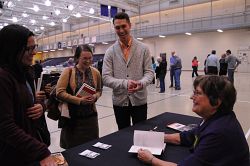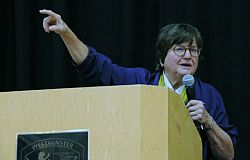Sister Helen Prejean: The death penalty is 'political symbolism'
Friday, Apr. 03, 2015

Intermountain Catholic
Photo 1 of 2
Sr. Helen Prejean signs one of her books for Samantha Almanza, Diocese of Salt Lake City Director of Youth and Young Adult Ministry, while theology teachers Jenny Klejeski and Rob Goodale look on. IC photo
SALT LAKE CITY — Sister Helen Prejean’s timing was propitious. Five days after Pope Francis decried the death penalty as “cruel, inhuman and degrading;” one day after Utah Gov. Gary Herbert signed a law bringing back the firing squad as a means of state-sponsored execution, and the same day that Bishop John C. Wester of Salt Lake City issued a statement saying that taking a human life is “a blasphemous attempt to assume divine attributes that we humble humans do not have,” the prominent opponent of the death penalty spoke at Westminster College as part of the Tanner-McMurrin Lecture Series.
Americans must confront their deep-seated ambivalence toward the death penalty, she said. For example, while five guns are used for the firing squad, only four have bullets, so none of those who pull the trigger can state for certainty that he or she was an executioner.
“Why don’t we shoulder up to it and say, ‘Yeah, we believe in killing people for their crime, so let’s do it’? Isn’t in honorable? Why do we have to hide the execution; why do we put a blank in one of the guns?” Sr. Prejean asked, noting that when the execution is by lethal injection, alcohol is swabbed on the convicted person’s arm before the IV is inserted.
“Germ-free death,” Sr. Prejean mocked. “At least Utah’s more honest: you’re going to bring the firing squad, and blood is going to drip to the bottom of that chair when the person is shot to death. You put a little red velvet heart on the person, strap him in the chair with five guns lined up, and then shoot him and kill him. This isn’t happening in India or Africa, this is happening in our state, and it’s being done in our name.”
The death penalty is disproportionately applied against poor people and minorities, but state legislators uphold the death penalty and “kill in good conscience, because they say, ‘This is what the people want. We don’t hear any people telling us not to do it,’” she said.
She urged her audience “to be a part of changing [the death penalty] in Utah. You mustn’t be so overwhelmed and say, ‘Oh, I’m one little person; I can’t change anything,’ and let paralysis take over. Things change when citizens wake up and we make a decision to become involved.”
The advocacy group Utahns for Alternatives for the Death Penalty “is educating the residents and mounting opposition to the death penalty,” she said, and asked her audience to visit http://www.utadp.org/ to learn more.
For the first half of her talk, Sr. Prejean told the story of how she became involved with the death penalty issue. She grew up in Baton Rouge, La. and joined the Community of St. Joseph in 1957, never dreaming that she would become an internationally known opponent to the death penalty, and author of a best-selling book that became an Academy Award-winning movie. That transformation began in 1981, when she decided to serve the poor and moved into the St. Thomas housing project in New Orleans.
“African-Americans became my teachers, and I began to see that there’s a whole other America where the rules were all different,” where families struggle with poverty, racism and lack of education, and every family has a relative in prison, she said.
She also became pen pals with Patrick Sonnier, a death row inmate who was convicted of murdering two teenagers. Eventually, she became his spiritual advisor, and later witnessed his execution. She tells this story in Dead Man Walking, the first of her two books, which was made into a Hollywood movie starring Susan Sarandon and Sean Penn.
She has continued to minister to death-row inmates and to date has accompanied six of them to their executions. Had she known that was what her future would bring, she never could have said yes, she said, “but I could say yes to writing a letter. … I believe the way God’s grace works in us [is that] it comes up under us as we need it, not ahead of time.”
After meeting the families of murder victims, she started working with victim support groups; in addition to creating the Ministry Against the Death Penalty she is the founder of Survive, a victim’s advocacy group in New Orleans that counsels families of murder victims. She also is the honorary chairperson of the Moratorium Campaign, which is gathering signatures for a worldwide moratorium on the death penalty, and has written a second book, The Death of Innocents: An Eyewitness Account of Wrongful Executions.
The death penalty issue involves more than those who are sentenced to death, Sr. Prejean said: Others who suffer are the victims’ families, the members of the jury who hear the case, and the prison staff who are involved with the execution.
“But we’re far removed from it. We don’t see it. We hear about it. It doesn’t touch most of us personally,” she said. “I’ve been crisscrossing the nation for 25 years talking to people, and most of them go, ‘I didn’t know it was like that!’”
Fewer death penalties are being carried out in the United States, she said, but it continues because “it’s political symbolism. And what changes political symbolism is the people getting to the politicians.”
Among the hundreds who attended Sr. Prejean’s talk was Sarah Buck, a parishioner of Saint Catherine of Siena Newman Center. “I think she has a really compelling message in a world that has become so violent,” Buck said, adding that she appreciated hearing the sister address what happens to young Americans who are disenfranchised in society.
Bishop Wester, who also attended the presentation, said hearing about Sr. Prejean’s interaction with the parents of the victims, and how Sonnier’s mother was affected by the experience was “hard to listen to, but very moving. It shows you how multifaceted the issue is, and the depth of the pain of the people on all sides.”
Also, “I found it an interesting point that she made, that we’re not into execution as much as we’re into political symbolism, which makes it in a way even sadder, that people’s lives are sacrificed for political symbolism,” the bishop said. “But I think she’s right – some politicians see those lives as expendable.”
For questions, comments or to report inaccuracies on the website, please CLICK HERE.
© Copyright 2024 The Diocese of Salt Lake City. All rights reserved.
© Copyright 2024 The Diocese of Salt Lake City. All rights reserved.


Stay Connected With Us